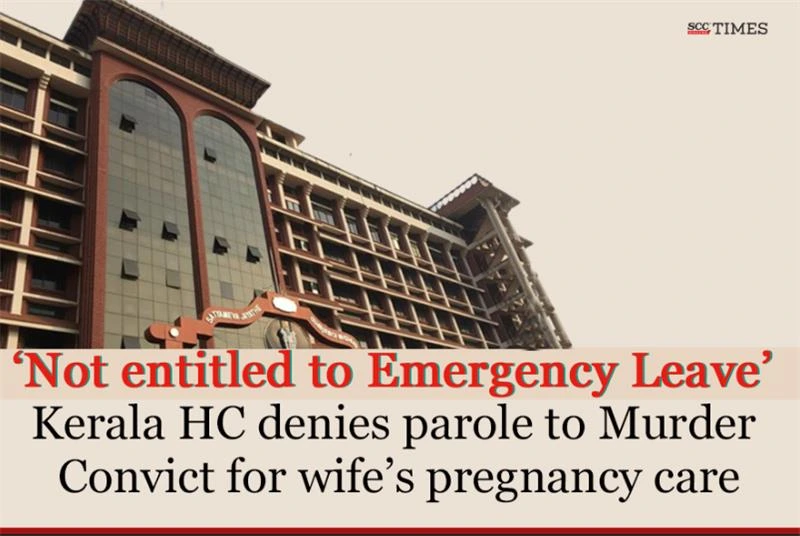Kerala High Court: In a petition filed by a life convict’s wife seeking emergency leave for him so that he could provide her pregnancy care, a Single Judge Bench of P.V. Kunhikrishnan, J., denied the emergency leave to him and held that extraordinary powers under Article 226 of the Constitution could not be exercised to grant parole to those convicted of serious offences.
Background:
The convict had committed a murder and was undergoing life imprisonment for the same. The couple got married in 2010 and had no children in their wedlock. The wife submitted that she and her husband had been trying to conceive for several years and after undergoing an IVF/ICSI procedure, she was two months pregnant. She conceived at the age of 42 years, and considering her age and the fact that the pregnancy was the result of IVF treatment, there existed a high risk of miscarriage if proper support and care were not given. Therefore, the wife submitted a representation to the Superintendent of the Central Prison and Correctional Home, Viyyur (‘Superintendent’), requesting emergency parole for her husband which was rejected.
The Superintendent, while rejecting the representation submitted by the victim, had observed that emergency leave could not be granted to the convict based on the provisions of Rule 400(1) of the Rule 2014, which mentioned the following circumstances in which emergency leave could be granted:
- Death or serious illness of very close relatives,
- Marriage of very close relatives, and
-
The house was partially or completely collapsed.
Hence, the present writ petition was filed.
Analysis and Decision:
Noticing that the convict was sent to jail because he murdered a person, the Court observed that most of his constitutional rights were suspended during the period of his sentence. It highlighted that the prison walls were not just physical barriers but also symbol of the suspension of certain fundamental rights that citizens enjoyed and the same could not be diluted by granting emergency leave to the convicts regularly unless there were extraordinary situations. Every convict must know that the victim and their relatives stared at them when they were in prison, and that staring was necessary and must be an eye-opener for their reformation.
The Court referred to Sandhya v. State of Kerala, 2023 SCC OnLine Ker 5708, and observed that an emergency leave could be granted only if the situation mentioned in sub clause (i) to (iii) of Rule 400(1) existed, or there was any extraordinary situation in which the Court could exercise its discretionary power and in all other cases, the emergency leave was to be dismissed in limine.
The Court emphasised that a convict was not entitled to emergency leave for giving care to his wife during the pregnancy. If that was the case, there would be no difference between a convict and an ordinary citizen. The convict should know that the families of the victims were in this society, and if the Court started granting emergency leave in a situation like this, the victims of the deceased would lose their faith in the judiciary.
“If the Court started granting emergency leave to convicts on birthdays, 28th day naming ceremonies, first rice feeding ceremonies etc., the people would lose faith in the judiciary.”
The Court further opined that the intention of sentencing was reformative, but the convict should be inside the jail, denied almost all the liberties of other citizens, then only the purpose of sentencing would be achieved. The Court observed that for giving pregnancy care to the convict’s wife, the Court need not exercise the extraordinary jurisdiction under Article 226 of the Constitution. While granting emergency leave by invoking its extraordinary jurisdiction, the Court must always keep in mind the interests of the victims and their relatives as their kith and kin might have been murdered after inflicting fatal injuries.
Hence, while dismissing the petition, the Court denied parole to the life convict for his wife’s pregnancy care and observed that it must always try to balance the interests of the victims and the basic needs of the convicts.
[Bindhu K.P v. State of Kerala, 2025 SCC OnLine Ker 5955, decided on 06-08-2025]
Advocates who appeared in this case:
For the Petitioner: Jerry Mathew, Devika K.R., Advocates.
For the Respondents: Sr PP, Seetha S, Advocate.



